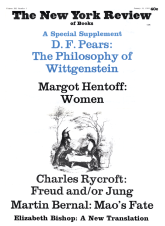In response to:
Mission Impossible from the November 21, 1968 issue
To the Editors:
I would like to reply to Conor Cruise O’Brien’s criticisms of my book, [NYR, November 21], not all of them, of course, since you do have a space problem. He chides me for calling the United States Mission to the United Nations, “the ‘other’ State Department,” which is also the title of my book. Yet it’s hard to think of how to describe ce machin-là. My title is not some personal idiosyncrasy. Robert Murphy and Senator Henry Jackson, as I point out in my book, both warned publicly that USUN was becoming “another state department.” Philip Klutznick, a USUN ambassador under Adlai Stevenson and Arthur J. Goldberg, has said that the State Department regards USUN as “an enemy in its midst.” Francis Plimpton, Stevenson’s deputy, cites a common saying at the Mission that “it’s easier to deal with the Soviets than with the [State] Department.” I think these and other perceptions validate what might appear to be a hyperbolic title.
As regards Henry Cabot Lodge’s refusal to follow State Department instructions on how to vote at the UN—I cannot say whether or not the “substance” of US policy was affected by his deviant behavior because the word “substance” in this context is hard to define. However, when an ambassador so upsets a Secretary of State (Dulles) that the latter feels it necessary to come to New York to cast the US vote at the General Assembly, one must assume that the vote has some relationship to the “substance” of policy. In any ordinary situation, an ambassador who so flouted a Secretary’s instructions would be transferred if not dismissed. Why don’t Presidents appoint career officers to this post? It is safe to predict that President-elect Nixon will look for some outstanding public figure for this job, even though it may louse up the table of organization.
On US cancellation of a license to sell six single-engine planes to South Africa—Professor O’Brien regards this as a trifling accomplishment by USUN. He fails to realize that had not this shipment been stopped, other “gray areas” material would have followed. The South African lobby in Washington had persuaded the government to grant shipping licenses on the theory that since the Cessnas were unarmed they were salable under the terms of the UN embargo. USUN argued to the contrary. Perhaps it is sound in law to say de minimis non curat lex but in diplomacy, where precedent can be important, you must concern yourself, as Goldberg did, with what seem to be trifles, like six Cessnas.
On Adlai Stevenson and the Article 19 controversy—Professor O’Brien has so telescoped my data that his criticism would seem well-taken. He summarizes my chapter in these words: “Stevenson, however, took the initiative leading to a compromise, getting less than what Washington originally thought obtainable; Stevenson’s compromise was that the General Assembly should meet without delay.” But that isn’t at all what I said. The point about Stevenson’s compromise is that neither President Kennedy nor President Johnson nor Secretary Rusk wanted any compromise with the Russians on their UN arrears. The State Department had pressured other member states to go along with the no-compromise position. State, as I pointed out, thought they had secret information that the Russians were ready to compromise on US terms. Stevenson reversed the US policy—not compromised—on his own initiative by committing the US to an unprecedented voteless Assembly in 1964. I described what happens when a strong-minded USUN Chief decides to take matters into his own hands. In this case, Stevenson was not merely a major factor but a dominant factor in the foreign policy process. There was no repudiation of Stevenson’s “compromise” because he probably would have resigned.
In its almost quarter-century existence under four Presidents, USUN has developed and even institutionalized for itself a quasi-independent role in the State Department, a situation which I doubt can be ascribed to any other actor in the State Department. It remains to be seen whether Mr. Nixon will seek to tidy up this anti-bureaucratic phenomenon.
Arnold Beichman
New York City
Conor Cruise O’Brien replies:
I regret that there was a misprint of my summary of Mr. Beichman’s account of the Article 19 controversy. “Without delay” should have read “without voting.” The summary which Mr. Beichman now offers is misleading, as can be seen by anyone who will consult his book (pp. 154-5). Mr. Beichman, in his summary says that Stevenson “reversed [Mr. Beichman’s italics] the US policy…on his own initiative.” Mr. Beichman in his book says… “Stevenson breakfasted with Rusk and urged upon Rusk adaption of the no-voting proposal. Rusk assented.” So Stevenson didn’t reverse US policy: Rusk reversed it, on the initiative of Stevenson. No “after State Department” theory is required to account for Stevenson’s initiative on this matter: if the real State Department had adhered to its earlier announced policy, it would have meant the euthanasia of the General Assembly, and a grave diminution in the importance of USUN. But Stevenson reacted to this threat, not by changing the policy but by inducing the real State Department to do so. It is indisputable that the US Ambassador to the UN—being a person who either already has or will soon acquire through television a wide popular appeal in the US—has a leverage not within reach of other Ambassadors. But his main activity—not within the purview of Mr. Beichman’s book—is in the presentation of policy, not in its formation. That the policy presented may have little connection with the policy actually formed was adequately demonstrated on the occasion of the Bay of Pigs.
This Issue
January 16, 1969



